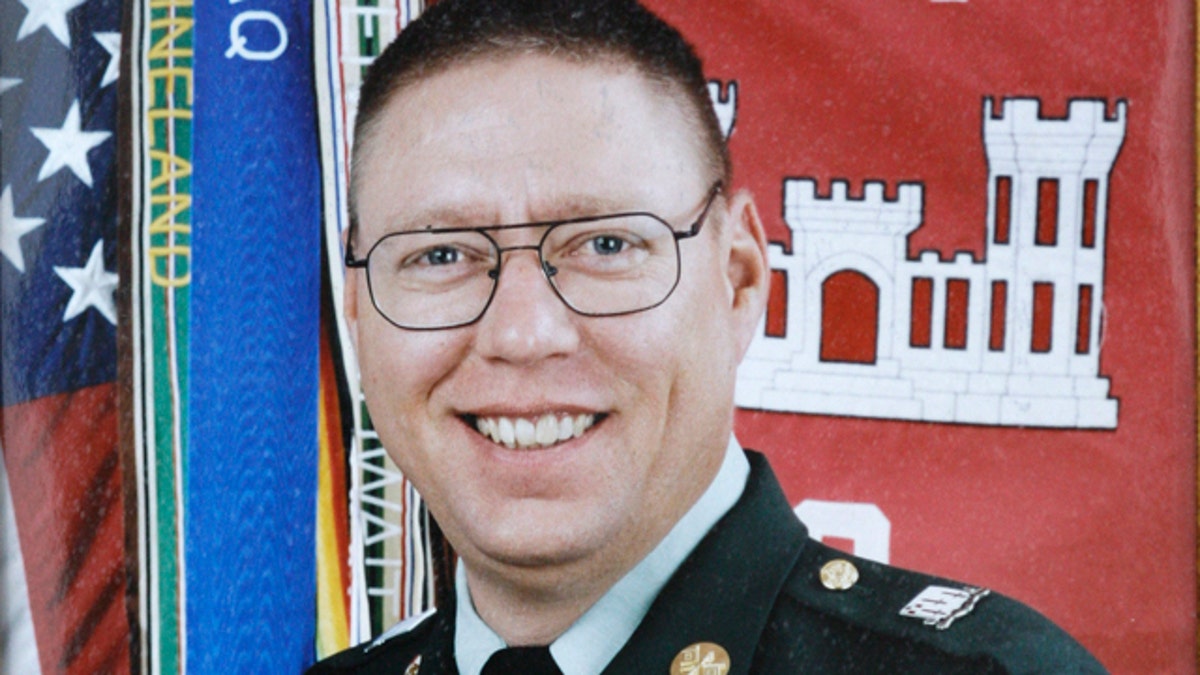
U.S. Army Sgt. John M. Russell is charged in a 2009 shooting that killed five service members at a mental health clinic in Iraq. (AP)
FORT LEAVENWORTH, Kan. – An Army chaplain testified Tuesday that he'd been worried for weeks about the deteriorating mental state of a soldier now accused of fatally shooting five service members at a U.S. combat stress clinic in Iraq.
Capt. Peter Keough said he and others had grown increasingly concerned about Sgt. John Russell, and had even dismantled his rifle, in the days leading up to the May 2009 shootings at Camp Liberty near Baghdad. They tried to get him assistance, even on the morning that Russell is accused of storming the clinic shortly after leaving a counseling session.
"He was distraught, he had been crying and I realized he needed care beyond pastoral care," Keough testified during a military hearing at Fort Leavenworth that will help determine whether Russell stands trial.
Russell, 46, is facing charges including five counts of premeditated murder for the shootings, which marked the deadliest act of soldier-on-soldier violence during the war in Iraq. The case cast a spotlight on combat stress, morale and mental health issues as troops increasingly served multiple combat tours.
Earlier Tuesday, Sgt. Dominic Morales testified that he and two other soldiers took cover in an office as Russell walked through the clinic shooting. Morales said he heard soldiers who were hit yelling out, "oh God, oh God."
The father of Army Sgt. Christian E. Bueno-Galdos, who was among those killed, was overcome during the testimony and left the courtroom. Bueno-Galdos, 25, was from Paterson, N.J.
The shootings also killed Navy Cmdr. Charles Springle, 52, of Wilmington, N.C., and three other Army service members: Pfc. Michael Edward Yates Jr., 19, of Federalsburg, Md.; Dr. Matthew Houseal, of Amarillo, Texas; and Spc. Jacob D. Barton, 20, of Lenox, Mo.
Prosecutors completed their case Tuesday, and defense attorneys will begin Wednesday. A military judge is hearing testimony at the Kansas post, where Russell is being held, during proceedings similar to a civilian grand jury.
The killings triggered an investigation that resulted in a 325-page report critical of the way the military was handling mental health issues while soldiers were deployed. In the report, Russell's unit acknowledged that it lacked the policies and procedures to effectively guide or treat soldiers who were suffering from combat stress or deemed at-risk of incident.
Russell, who grew up in a small Texas town north of Dallas, had been ordered to seek counseling after reporting he was suicidal. He was assigned to the 54th Engineer Battalion of Bamberg, Germany.
Capt. Mark Natale, Russell's section leader in Iraq, testified that Russell was angry and believed some of his colleagues were trying to ruin his career. Natale said he tried to get Russell in to see mental health doctors.
But Russell said the doctors laughed at him and said there was nothing wrong, making degrading and "less than humane" comments about him, Natale testified.
Natale said he checked daily on Russell to make sure he was eating and getting treatment. Worried that he might shoot himself, Natale took the firing bolt from Russell's M-16 rifle so it couldn't shoot just days before the shooting.
Keough, the chaplain, testified that the rifle was removed the morning of the shooting because of Russell's condition.
During the first day of the hearing Monday, former Army Reserve psychiatrist Michael Jones said he saw Russell the day before the shooting for the first time and prescribed him an antidepressant. The next day — May 11, 2009 — Russell left Jones' office shortly after a counseling session began, indicating he'd had enough with the treatment he was receiving and stormed out of the clinic, Jones said. Days earlier, he'd been to a mental health clinic at a nearby U.S. base.
Staff Sgt. Bryan Benz, a military police officer in Iraq at the time of the shooting, testified Tuesday that it was policy that two officers escort any suicidal soldier to be evaluated and observed by mental health staff.
Benz said he thought that was what was happening when he responded to the stress clinic when Jones and Russell had their encounter, but that Jones wanted Russell removed from the clinic and to "come back when he could control his anger."

